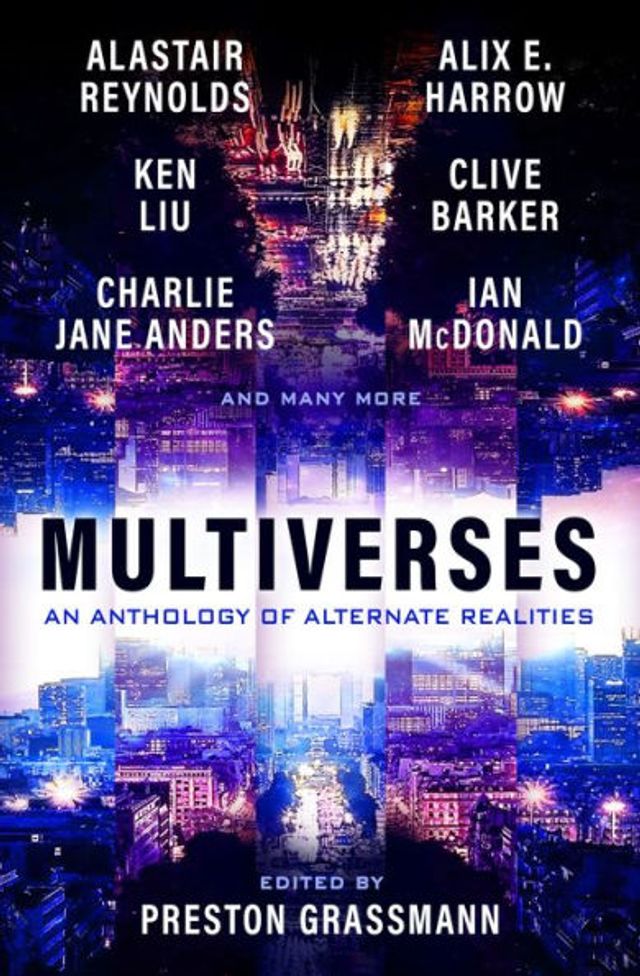Home
Exploring Alternate Realities Through Parallel Worlds
Barnes and Noble
Exploring Alternate Realities Through Parallel Worlds
Current price: $26.00


Barnes and Noble
Exploring Alternate Realities Through Parallel Worlds
Current price: $26.00
Size: OS
Loading Inventory...
*Product information may vary - to confirm product availability, pricing, shipping and return information please contact Barnes and Noble
The idea of equal universes and substitute real factors has long caught the human creative mind, offering an enticing look into the conceivable outcomes of a multiverse where various variants of our world exist together. This charming thought, established in both sci-fi and logical hypothesis, has turned into a wellspring of interest and consideration for some. In this short investigation, we will dive into equal universes and how it has been portrayed in writing, science, and mainstream society.
Equal universes or substitute real factors proposes the presence of numerous universes close by our own, each with its own extraordinary arrangement of conditions, results, and potential outcomes. An idea challenges our customary comprehension of the universe and prompts us to consider the tremendousness of what lies past our nearby discernment.
Equal universes have been a repetitive subject in writing, with writers and narrators utilizing them to create stories that investigate the outcomes of various decisions and occasions. Books as carroll Lewis' "Into another world" and Philip K. Dick's "The Man in the High Palace" have offered perusers looks into universes that vary essentially from our own, acquainting them with substitute renditions of reality that flash the creative mind.
In the domain of science, equal universes tracks down its foundations in quantum mechanics. The "many-universes translation" is a quantum hypothesis that proposes that at each snapshot of choice or quantum occasion, the universe parts into numerous branches, with each branch addressing an alternate result. While this translation stays a subject of discussion inside mainstream researchers, it has enamored the personalities of the people who contemplate the ramifications of a multiverse where each conceivable result happens in a different reality.
Mainstream society has embraced the idea of equal universes with energy, as found in films like "The Framework," where characters explore between a mimicked reality and this present reality, and television series like "More bizarre Things," where substitute aspects and truths are fundamental to the plot. These depictions resound with crowds, provoking them to consider the results of such a peculiarity and the secrets it could open.
Investigating substitute real factors through equal universes likewise offers a philosophical focal point through which we can inspect our own lives and decisions. The "imagine a scenario in which" questions that emerge while examining various ways not taken or various results to verifiable occasions welcome thoughtfulness and examination. It urges us to consider the job of possibility and decision in shaping our lives.
In synopsis, the idea of equal universes and substitute truths is an enrapturing and diverse thought that has saturated writing, science, and mainstream society. It welcomes us to think about the tremendousness of potential outcomes past our nearby reality and urges us to investigate the results of various decisions and occasions. Whether in the domains of fiction, science, or reasoning, the investigation of equal universes stays a provocative and creative excursion into the unexplored world.
Equal universes or substitute real factors proposes the presence of numerous universes close by our own, each with its own extraordinary arrangement of conditions, results, and potential outcomes. An idea challenges our customary comprehension of the universe and prompts us to consider the tremendousness of what lies past our nearby discernment.
Equal universes have been a repetitive subject in writing, with writers and narrators utilizing them to create stories that investigate the outcomes of various decisions and occasions. Books as carroll Lewis' "Into another world" and Philip K. Dick's "The Man in the High Palace" have offered perusers looks into universes that vary essentially from our own, acquainting them with substitute renditions of reality that flash the creative mind.
In the domain of science, equal universes tracks down its foundations in quantum mechanics. The "many-universes translation" is a quantum hypothesis that proposes that at each snapshot of choice or quantum occasion, the universe parts into numerous branches, with each branch addressing an alternate result. While this translation stays a subject of discussion inside mainstream researchers, it has enamored the personalities of the people who contemplate the ramifications of a multiverse where each conceivable result happens in a different reality.
Mainstream society has embraced the idea of equal universes with energy, as found in films like "The Framework," where characters explore between a mimicked reality and this present reality, and television series like "More bizarre Things," where substitute aspects and truths are fundamental to the plot. These depictions resound with crowds, provoking them to consider the results of such a peculiarity and the secrets it could open.
Investigating substitute real factors through equal universes likewise offers a philosophical focal point through which we can inspect our own lives and decisions. The "imagine a scenario in which" questions that emerge while examining various ways not taken or various results to verifiable occasions welcome thoughtfulness and examination. It urges us to consider the job of possibility and decision in shaping our lives.
In synopsis, the idea of equal universes and substitute truths is an enrapturing and diverse thought that has saturated writing, science, and mainstream society. It welcomes us to think about the tremendousness of potential outcomes past our nearby reality and urges us to investigate the results of various decisions and occasions. Whether in the domains of fiction, science, or reasoning, the investigation of equal universes stays a provocative and creative excursion into the unexplored world.


















